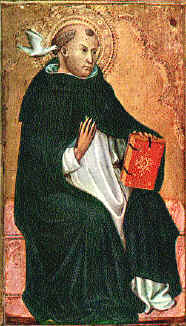Thomas Aquinas
Priest,
Friar, and Theologian
d 28 January 1274
 Thomas Aquinas was
born of a noble family in Roccasecca, near Aquino, and was educated at the
Benedictine monastery of Monte Cassino and at the University of Naples. He joined the
Dominican order while still an undergraduate in 1243, the year of his father's death.
His mother, opposed to Thomas's affiliation with a mendicant order, confined him to
the family castle for more than a year in a vain attempt to make him abandon his
chosen course. She released him in 1245, and Aquinas then journeyed to Paris to
continue his studies. He studied under the German Scholastic philosopher Albertus
Magnus, following him to Cologne in 1248. Because Aquinas was heavyset and taciturn,
his fellow novices called him Dumb Ox, but Albertus Magnus is said to have predicted
that "this ox will one day fill the world with his bellowing."
Thomas Aquinas was
born of a noble family in Roccasecca, near Aquino, and was educated at the
Benedictine monastery of Monte Cassino and at the University of Naples. He joined the
Dominican order while still an undergraduate in 1243, the year of his father's death.
His mother, opposed to Thomas's affiliation with a mendicant order, confined him to
the family castle for more than a year in a vain attempt to make him abandon his
chosen course. She released him in 1245, and Aquinas then journeyed to Paris to
continue his studies. He studied under the German Scholastic philosopher Albertus
Magnus, following him to Cologne in 1248. Because Aquinas was heavyset and taciturn,
his fellow novices called him Dumb Ox, but Albertus Magnus is said to have predicted
that "this ox will one day fill the world with his bellowing."
Before the time of Aquinas, Western thought had been dominated by the philosophy of St. Augustine, the Western church's great Father and Doctor of the 4th and 5th centuries, who taught that in the search for truth people must not depend upon sensory experience. Early in the 13th century the major works of Aristotle were made available in a Latin translation, accompanied by the commentaries of AverroŽs and other Islamic scholars. The vigor, clarity, and authority of Aristotle's teachings restored confidence in empirical knowledge and gave rise to a school of philosophers known as Averroists. Under the leadership of Siger de Brabant, the Averroists asserted that philosophy was independent of revelation.
These works offered a new and exciting way of looking at the world. Many enthusiastic students of Aristotle adopted him quite frankly as an alternative to Christianity. The response of many Christians was to denounce Aristotle as an enemy of the Christian Faith. A third approach was that of those who tried to hold both Christian and Aristotelian views side by side with no attempt to reconcile the two. Aquinas had a fourth approach. While remaining a Christian, he immersed himself in the ideas of Aristotle, and then undertook to explain Christian ideas and beliefs in language that would make sense to disciples of Aristotle. At the time, this seemed like a very dangerous and radical idea, and Aquinas spent much of his life living on the edge of ecclesiastical approval.
More successfully than any other theologian or philosopher, Aquinas organized the knowledge of his time in the service of his faith. In his effort to reconcile faith with intellect, he created a philosophical synthesis of the works and teachings of Aristotle and other classic sages; of Augustine and other church fathers; of AverroŽs, Avicenna, and other Islamic scholars; of Jewish thinkers such as Maimonides and Solomon ben Yehuda ibn Gabirol; and of his predecessors in the Scholastic tradition. This synthesis he brought into line with the Bible and Church doctrine.
St. Thomas was an extremely prolific author, and about 80 works are ascribed to him. The two most important are Summa Contra Gentiles (On the Truth of the Catholic Faith, 1261-64), a closely reasoned treatise intended to persuade intellectual Muslims of the truth of Christianity; and Summa Theologica (Summary Treatise of Theology, 1265-73), in three parts (on God, the moral life of man, and Christ), of which the last was left unfinished. Summa Theologica has been republished frequently in Latin and vernacular editions.
Aristotle is no longer the latest intellectual fashion, but Aquinas's insistence that the Christian scholar must be prepared to meet other scholars on their own ground, to become familiar with their viewpoints, to argue from their premises, has been a permanent and valuable contribution to Christian thought.
Some Christian scholars today are undertaking, with varying degrees of success, to explore the relations between Christianity and various contemporary studies or world-outlooks that have been used as weapons by opponents of Christianity. Examples include the following:
- William G Pollard, Anglican priest, nuclear physicist at the Oak Ridge Laboratory, Executive Director of the Oak Ridge Institute for Nuclear Studies, and author of Chance and Providence and Physicist and Christian (both out of print).
- John Polkinghorne, FRS, Anglican priest, head of Queen's College, Cambridge, nuclear physicist, and author of Science and Creation, Science and Providence, and various other works, including most recently The Faith of a Physicist,
Acknowledgements:
Text adapted from James Kiefer's Christian Biographies,
Summa
Theologiae
Image from
Domestic-Church